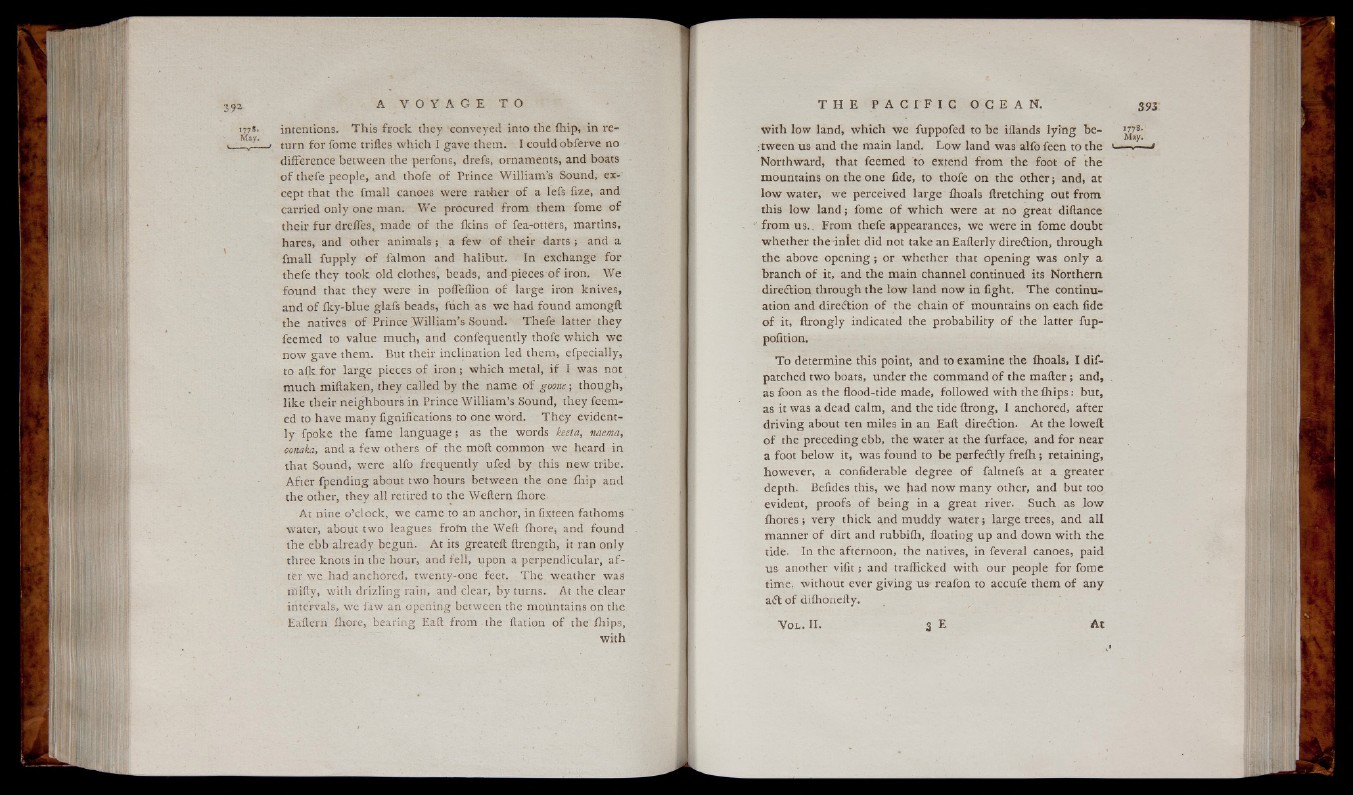
177»- intentions. T h is fro ck they conveyed into the {hip, in re-
i turn for fome trifles w hich I gave them. I could obferve no
difference between the perfons, drefs, ornaments, and boats
o f thefe people, and thofe o f Prince W illiam ’s Sound, except
that the fmall canoes were rather o f a lefs fize, and
carried only one man. We procured from them fome o f
their fu r drefles, made o f the ikins o f fea-otters, martins,
hares, and other animals ; a few o f their darts ; and a
fmall fupply o f falmon and halibut. In exchange for
thefe they took old clothes, beads, and pieces o f iron. We
found that they were in pofleflion o f large iron knives,
and o f fky-blue glafs beads, fuch as we had found amongft
the natives o f Prince W illiam ’s Sound. Thefe latter they
feemed to value much, and confequently thofe w hich we
now gave them. But their inclination led them, efpecially,
to a fk for large pieces o f iro n ; w h ich metal, i f I was not
much miftaken, they called by the name o f goone; though,
lik e the ir neighbours in Prince W illiam’s Sound, they feemed
to have many fignifications to one word. T h e y evidently
fpoke the fame la n g u a g e ; as the words keeta, naema,
oonaka, and a few others o f the moft common we heard in
that Sound, were alfo frequently ufed by this new tribe.
After fpending about two hours between the one fhip and
the other, they all retired to the Weftern ihore-
At nine o’clock, we came to an anchor, in fixteen fathoms
water, about two leagues frofti the Weil ihore, and found
the ebb already begun. At its greateft ftreng.th, it ran only
three knots in the hour, and fell, upon a perpendicular, a f ter
we had anchored, twenty-one feet, The weather was
rfiifty, with drizling rain, and clear, by turns. At the clear
intervals, we faw an opening between the mountains on the
Eaftern ihore, bearing Eaft from the ftation o f the fhips,
with
■with low land, w hich w e fuppofed to be iflands ly in g betw
e e n us and the main land. L ow land was alfo feen to the
Northward, that feemed to extend from the foot o f the
mountains on the one fide, to thofe on the o th e r ; and, at
low water, we perceived large ihoals ftretching out from
this low la n d ; fome o f w h ich were at no great diftance
from u s .. From thefe appearances, w e were in fome doubt
whether the in le t did not take an Eafterly diredtion, through
the above o p en in g ; or whether that opening was on ly a
branch o f it, and the main channel continued its Northern
direction through the low land now in fight. T h e continuation
and direction o f the chain o f mountains on each fide
o f it, ftrongly indicated the probability o f the latter fup-
pofition.
T o determine this point, and to examine the fhoals, I dispatched
two boats, under the command o f the mailer ; and,
as foon as the flood-tide made, followed with the Ih ip s : but,
as it was a dead calm, and the tide ftrong, I anchored, after
driving about ten miles in an Eaft diredtion. At the loweft
o f the preceding ebb, the water at the furface, and for near
a foot below it, was found to be p e r fe illy f r e ih ; retaining,
however, a confiderable degree o f faltnefs at a greater
depth. Befides this, we had now many other, and but too
evident, proofs o f being in a great river. Such as low
ih o r e s ; very thick and muddy w a te r ; large trees, and a ll
manner o f dirt and rubbifh, floating up and down w ith the
tide. In the afternoon, the natives, in feveral canoes, paid
us another v if it ; and trafficked with our people fo r fome
time, without ever g iv in g us reafon to accufe them o f any
a i l o f difhonefty.
1778.
May.